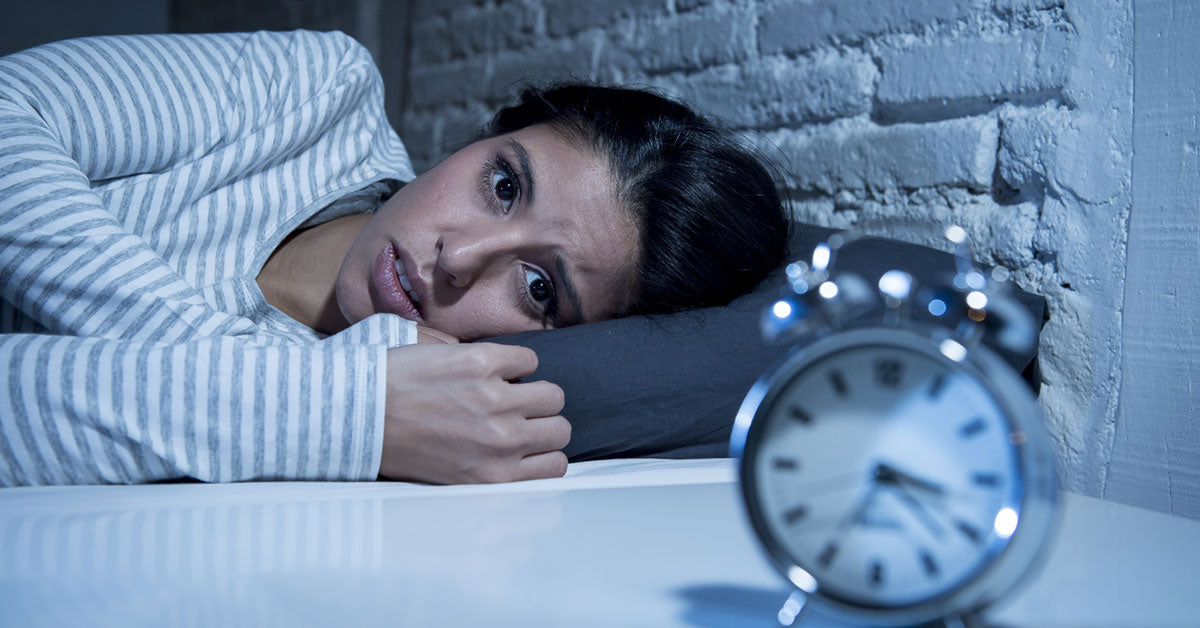Night time Anxiety Cycle: How to Break the Cycle

Getting quality sleep is vital for both physical and psychological health however, for some getting a good night’s rest is easier said than done due to night-time anxiety. Some people experience anxiety and panic attacks that wake them, while others have trouble falling asleep due to stress. This can result in sleep deprivation, which may worsen both physical and mental health.
While your night-time anxiety may cause you to feel overwhelmed and frustrated, you should know that there are ways to break the cycle. In this article, we’ll discuss how to manage your anxiety so you can finally get some sleep.
What is Night Time Anxiety?
Night time anxiety refers to excessive fear, worry, or stress that occurs in the evening or when you’re trying to get to sleep. It’s very common, particularly among people who worry about noises they hear in the dark or fixate on upsetting events during the day.
Generally speaking, anxiety is an emotion that occurs as a response to a perceived threat, stressful event, or train of thought. In many cases, the feeling dissipates when the ‘threat’ subsides. However, in some people, the anxiety is persistent, especially at night. If this is the case for you, it’s important to identify the cause to help manage your anxiety and improve your quality of life.
In this article, we’ll answer key questions like, “How long does anxiety last?” and discuss other important facts about nocturnal stress.
The Link between Sleep and Night Time Anxiety
Anxiety and sleep are strongly intertwined. Night-time anxiety makes it difficult to fall asleep, stay asleep, and experience the restorative benefits of sleep, which in turn can worsen anxiety symptoms.
Anxiety can prevent you from falling asleep by making your mind overactive and causing racing thoughts. Even when you finally fall asleep, your rest may be of poor quality and lack the restorative benefits required for mental and emotional well-being.
There is evidence[1] to indicate that anxiety is associated with sleep disturbances, decreased total sleep time and quality, and reduced sleep continuity. In addition, there are aspects of anxiety that can lead to alertness and arousal[2] , which affects the sleep-wake cycle.
The relationship between night-time anxiety and sleep is a two-way street. Sleep deprivation leads to anxiety by increasing levels of the stress hormone cortisol. Elevated cortisol, in combination with other factors, can feed anxiety and harm your mental health. In addition to general anxiety symptoms, some people may also experience panic attacks at night. This can occur when sleep deprivation or poor sleep quality leads to an overactivation of the stress response in your central nervous system.
Symptoms of Night Time Anxiety
If you want to know how to get rid of bad anxiety at night, begin by addressing the specific symptoms. The basic symptoms of anxiety at night are similar to those that occur at any other time, but some signs are specific to nocturnal stress. The most common include:
-
Physical Symptoms: People with nocturnal anxiety often experience breathing difficulties, heart palpitations, sweating, and lightheadedness. This happens because anxiety triggers a fight-or-flight response that causes symptoms similar to those you would experience in a threatening situation.
-
Aches and Pains: Anxiety may cause muscle tension, which often leads to headaches, jaw pain, and tightness in the chest.
-
Panic Attacks: In severe cases, anxiety can lead to panic attacks at night that can cause a feeling of loss of control. In some cases, people feel like they are going to die, although it’s far from the case.
-
Rumination: This refers to the action of fixating on things that upset or worry you. When you’re in bed alone with your thoughts, you may ruminate about finances, past trauma, or recent disputes and arguments.
-
Uncontrolled Thoughts: Your nocturnal anxiety may lead to a perceived inability to control your thoughts. As a result, you may focus on irrational ideas that come into your mind, which can worsen your anxiety.
-
Nightmares: People with anxiety often have nightmares[3], which can lead to more severe anxiety. In addition to nightmares, some people may experience flashbacks to traumatic events when lying awake trying to sleep.
The Consequences When Night Time Anxiety Interrupts Sleep
When night-time anxiety interrupts sleep, it can set a negative chain of events into motion. The immediate impact is that you can’t achieve restorative rest[4], which weakens your body’s ability to cope with stress. As a result, anxiety levels may rise.
Since stress can sometimes cause nightmares and disturbing dreams that interrupt sleep, you could start to fear going to bed. More precisely, you could develop sleep anxiety surrounding being able to fall or remain asleep. Frequently interrupted sleep can lead to poor mood, loss of interest in daily activities, and impaired productivity at work or school.
So, how long does anxiety last? The feeling may be transient, or it can last for days until you tackle the source of the problem. Panic attacks last anywhere from a few minutes to half an hour.
How to Reduce Night Time Anxiety
What everyone with this problem wants to know is how to get rid of bad anxiety at night, and you’ll be happy to hear that there are many possible solutions. These are some of the best tips for decreasing night-time anxiety:
-
Establish a Caffeine Cut-Off: Caffeine is a stimulant that worsens your anxiety and interferes with sleep. Establish a daily cut-off time for caffeine intake, for example, decide that after 6 pm you won’t drink coffee.
-
Journaling: Writing down your thoughts before bed may prevent you from fixating on them when you’re trying to sleep. Journaling helps you “unload” your mind [5] and let go of racing thoughts. Make it a habit to write in your journal before bed to promote calmness, and also consider taking Nuu3 Keep Calm Gummies to lower stress and improve your rest.
-
Give Yourself Something to Look Forward to: Create positive anticipation before you go to sleep by planning something enjoyable for the next day or the weekend. By focusing on a positive event you may divert your attention away from irrational thoughts.
-
Try Yoga: Practicing yoga can reduce stress levels and promote calmness. There is a growing body of evidence[6] that confirms the effectiveness of yoga in reducing the symptoms of anxiety and depression. In addition, yoga may help decrease the frequency of panic attacks at night.
-
Meditation: This practice helps you let go of stress and worry, making it easier to transition to deep sleep. When you meditate, you aren't thinking about how to get rid of bad anxiety at night. Your mind is at peace, so the anxiety subsides without you fixating on it.
How Night Time Anxiety Can Affect You the Next Day
Anxiety at night disrupts sleep, which often leads to fatigue or drowsiness the next day. This can also boost your daytime stress levels, possibly decreasing your mood and motivation and lowering your productivity at school or work. In short, anxiety before bed can make the next day less enjoyable and a lot more frustrating.
What Happens When You Don’t Get Enough Sleep
The consequences of sleep deprivation depend on the answer to several questions, for example, how long does anxiety last, and how often does it occur? If you experience anxiety every night and you consistently fail to get enough sleep, you are at risk for various health problems [7] including-
Emotional Instability: Poor sleep can cause mood swings, irritability, and heightened emotional sensitivity, possibly worsening the symptoms of anxiety and depression.
-
Poor Immune Functioning: Sleep deprivation compromises the immune system and its ability to protect you against viruses, bacteria, and other pathogens.
-
Elevated Stress Response: Insufficient sleep causes an overactive stress response, which increases your risk of developing chronic anxiety.
-
Weight Gain: Sleep deprivation slows down your metabolism and increases food intake and cravings, which can contribute to weight gain.
-
Increased Risk of Chronic Conditions: When you don’t get enough sleep regularly, it increases your susceptibility to developing chronic conditions such as high blood pressure, diabetes, and cardiovascular disease.
-
Poor Memory: Since sleep plays an important role in consolidating memories, a poor night’s rest can affect your ability to recall information.
How to Prevent Night Time Anxiety
Although anxiety at night can be overwhelming, in most cases it is preventable or at least manageable. Here are a few strategies that work:
-
Follow a Healthy Diet: Following a well-balanced diet supports mental health[8] because it delivers vitamins, minerals, and antioxidants that improve mood and alleviate anxiety. Reduce or avoid processed, sugar-laden foods and consume mostly fruits, vegetables, protein, and healthy fats.
-
Exercise Regularly: Physical activity is a natural stress reliever because it releases ‘feel-good chemicals’ called endorphins. Aim for 150 minutes of moderate exercise each week, and power up your workouts with an energy boost from Nuu3 Nature’s Superfuel.
-
Practice Good Sleep Hygiene: Maintain a consistent sleep schedule by going to bed and waking up at the same time each day. Good sleep hygiene also involves creating a comfortable sleep environment, getting 7 to 9 hours of sleep nightly, and avoiding excess blue light exposure from your TV, phone, computer, or tablet right before bed. In addition, taking a supplement like Nuu3 Sleep Support Gummies can improve the quality of your rest.
-
Take Medication: In some cases, night-time anxiety is caused by an underlying mental health issue or a sleep disorder. If you have been diagnosed with one of these conditions, you may want to discuss the possibility of taking medication with your doctor. If you are prescribed something, don’t stop taking it without consulting a healthcare professional first. By managing the underlying condition, you may be able to prevent anxiety at night.
Frequently Asked Questions
What causes panic attacks at night?
There is no one specific cause of panic attacks at night, as they may occur for various reasons. One possibility is the lack of distractions that leave you alone with your thoughts, which could make you more inclined to focus on irrational ideas that feed your anxiety.
Other possible factors involved in nocturnal panic attacks [9] include genetics, stress, and underlying conditions such as sleep disorders or thyroid issues. Sometimes night-time panic attacks have no obvious trigger and may even wake you from sleep.
What is the best position to sleep in for anxiety?
The best sleeping position to alleviate anxiety is on your back, and it’s considered optimal for both physical and mental health overall. Lying on your back keeps your neck and spine neutral, so you wake up with less discomfort or pain in those particular areas. This can improve overall sleep quality, which is important for your mental health.
However, sleeping on your side in a fetal position also promotes calmness and relaxation. If you’re trying to figure out how to get rid of bad anxiety at night, you may want to consider sleeping on either your back or your side.
Bottom Line
Night-time anxiety can have a very negative impact on sleep quality and overall well-being if you don’t take measures to decrease it. The feeling can be overwhelming, especially when it’s persistent. As powerful as your emotions may be, it is more than possible to manage and prevent night-time stress and anxiety.
In this article, we have discussed anxiety at night, answered the question, ‘How long does anxiety last?’ and provided you with helpful ways to reduce your night-time stress. In particular, following a healthy lifestyle and managing any underlying medical issues can help significantly.
References
1] ↑https://pubmed.ncbi.nlm.nih.gov/32109832/
2] ↑https://www.ncbi.nlm.nih.gov/pmc/articles/PMC3181635/
3] ↑https://pubmed.ncbi.nlm.nih.gov/16377217/
4] ↑https://www.ncbi.nlm.nih.gov/pmc/articles/PMC4651462/
5] ↑https://www.ncbi.nlm.nih.gov/pmc/articles/PMC8935176/
6] ↑https://www.ncbi.nlm.nih.gov/pmc/articles/PMC3193654/
7] ↑https://www.healthline.com/health/sleep-deprivation/effects-on-body
8] ↑https://www.ncbi.nlm.nih.gov/pmc/articles/PMC8880234/
9] ↑https://www.mayoclinic.org/diseases-conditions/panic-attacks/expert-answers/panic-attacks/faq-20057984












